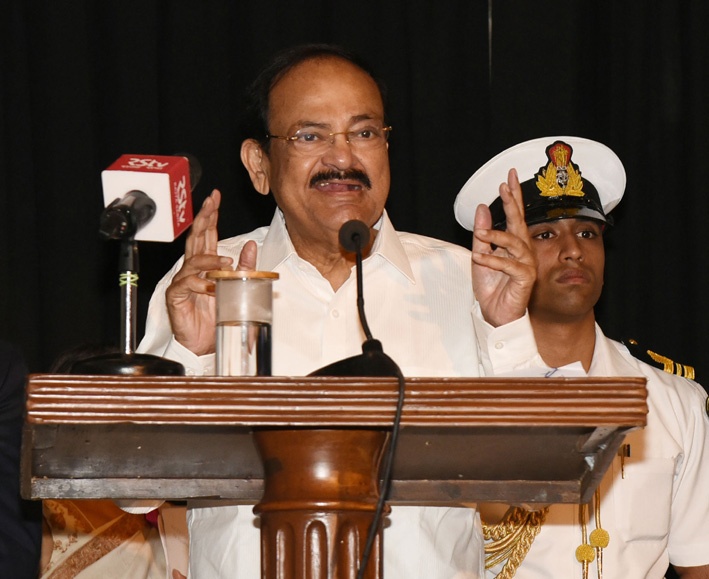
The Vice President of India, Shri M Venkaiah Naidu today stressed the need to promote the family system, and its values right from school days and teach children the need to respect elders. He urged immediate family members of the elderly and community at large to accord the highest priority to their care and wellbeing.
Addressing the gathering after releasing the book, “Health and Well Being in Late Life: Perspectives and Narratives from India” written by Dr. Prasun Chatterjee, a specialist in Geriatric Medicine, AIIMS, he described Indian family system and family values as the USP of Indian civilization.
Deploring the tendency to ape western culture, Shri Naidu called for a societal and attitudinal change and said that we must go back to the Indian family system, values, culture, and traditions. Respect for parents, Guru, and nature is ingrained in the Indian philosophy.
Expressing anguish over reports of abuse of elders and their abandonment, he said that many elders were forced to stay in old age homes. He said that it was the bounden duty of children to take good care of their parents and grandparents.
Stating that India was ageing much faster than previously thought and expected to have nearly 20 percent population of the world’s 60 years and above by 2050 with the largest number of older adults in the world, the Vice President said that one must be prepared to address all challenges and be prepared to give elders a joyous, healthy and happy late life.
Pointing out that ageing increases one’s susceptibility to many diseases and conditions, the Vice President said that there was an urgent need to set up more Geriatric Departments in medical colleges across the country in view of the increasing population of the elderly. He also asked all stakeholders in the health sector to work for the well being of the elderly and stressed that good health was the right of all, irrespective of age.
Shri Naidu appreciated the government of India for implementing the National Programme for Health Care of the Elderly (NPHCE). He said that the government was proactively working on lifestyle modification, non-communicable disease management, vision and hearing problem management, and accessible health care through Ayushman Bharat.
Keeping the rise in demand for specialized care for elderly people, the Vice President wanted institutes like AIIMS to be at the forefront in promoting healthy ageing.
Talking about the book, he said that it discusses preparedness for an aging individual as well as the society in the Indian context. Apart from highlighting the health issues like depression and dementia, Shri Naidu said that the book provides a detailed analysis of solutions that are practicable in low resource settings.
The President of IGNCA, Shri Ram Bahadur Rai, Director, AIIMS, Dr. Randeep Guleria, Head of Department of Geriatric Medicine, AIIMS, Dr. A. B. Dey, the Managing Director of Springer Nature, Shri Sanjiv Goswami and others were present.
The Following is the full text of the speech:
I am delighted to release the book “Health and Well Being in Late Life: Perspectives and Narratives from India” written by Dr Prasun Chatterjee, a specialist in Geriatric Medicine and an Associate Professor at the Department of Geriatric Medicine, AIIMS.
It is a timely and important book as Geriatric Medicine deals with healthcare issues in the elderly people.
Today, the world is ageing as a result of unprecedented success of the medical science, adding almost 20-30 years of life expectancy to humans as compared to the last millennium.
I am told that by end of this year (2019), the number of older adults aged 65 and above would be more than the children aged five years or less for the first time in the history of mankind on this planet.
India is ageing much faster than previously thought and expected to have nearly 20 per cent population of the world’s 60 years and above by 2050 with the largest number of older adults in the world.
The patterns of aging vary greatly among older people. Yet we are seldom prepared for ageing. Somehow, it Is a topic that we all fear to talk about. Each elderly person is a living snapshot of everyone’s tomorrow. Due to the aging process, the old people often feel depressed, lonely and find it difficult to adjust to the changes taking place as a result of aging.
It should be noted that ageing increases one’s susceptibility to many diseases and conditions. Older people often suffer from multiple health issues from chronic conditions to dementia.
In this lucidly written evidence-based book, Dr. Prasun Chatterjee talks about the less discussed topics and issues like frailty in elderly, fall in elderly, living with failing memory, complexity of diagnosing cancer, constipation, stroke and treating a terminally ill patient, among others.
The author describes how one should navigate the path of ageing. This is a topic which touches our lives, our aging parents or people who are aging. With stories from real life cases, Dr. Chatterjee not only writes for the practitioner, but also provides an insight for the ordinary person to understand the medical and social problems of this greying population.
This book provides a holistic understanding on the issue of old age, and situates the aged person within the context of family, caregivers, clinical and other institutions. All through the book, the author discusses preparedness for an aging individual as well as the society in the Indian context.
Apart from highlighting the health issues like depression and dementia, the author also provides a detailed analysis of solutions that are practicable in low resource settings.
The book uses narratives of elderly patients which makes it interesting to even non-academic readers.
I feel it is a must read book for all to have a correct perspective on ageing. How you live your life at the age of 40 will decide the health condition of later years. A chronic smoker of 40 years cannot expect to have a healthy lung and heart at the age of 70.
I am told that six medical colleges, at present, are imparting the special skill to the doctors to cater to geriatric population. I feel that there is an urgent need to set up more Geriatric Departments in medical colleges across the country in view of the increasing population of the elderly.
With the WHO declaring 2020 to 2030 as “Decade of Healthy Ageing”, I expect Institutes like AIIMS to be in the forefront in promoting healthy ageing. I am happy to know that Dr Prasun Chatterjee is not only spreading the message of active ageing but also participating in community building by promoting Active engagement of older adults.
I would also like to appreciate the government of India for implementing the National Programme for Health Care of the Elderly (NPHCE). I am also glad to know that the National Centre for Ageing at AIIMS, a state of art 200-bedded exclusive geriatric care centre, will be functional by next year. I am told that apart from providing international standard of care, it will also undertake cutting-edge research on ageing.
However, I would like every stakeholder in the health sector to work for the well being of the elderly as good health is the right of all, irrespective of age.
|The book underlines the importance of the leading a healthy lifestyle to prevent various chronic diseases. What I understand from this book is that nutritional intervention and some form of exercise always helps. The author tries to dispel the myth that “ageing population would invariably develop dementia or forgetfulness”. He lays stress on preventable risk factors like smoking, hypertension and diabetes, among others.
I am happy that the Government is proactively working on life style modification, non-communicable disease management, vision and hearing problem management and accessible health care through Ayushman Bharat.
Taking proper care of the elderly should be accorded highest priority by immediate family members and the community. I get anguished when I come across reports of abuse of elders or their abandonment. Many elders are also forced to stay in old age homes. I feel that there is an urgent need to promote family system and its values.
I was most touched by the last chapter in which the author mentioned about the ‘secret of successful ageing’. This chapter presented the stories of people, who led healthy and happy lives and explained how to be happy in late life.
Lastly, I am told that the royalty of this book would be used to empower elderly through engagement with underprivileged school children. I hope this model would help to curb drop out in schools and promote active ageing.
I congratulate Dr Chatterjee for writing this informative and inspiring book. I also appreciate his devotion to the cause of geriatric medicine.
";

.jpg)